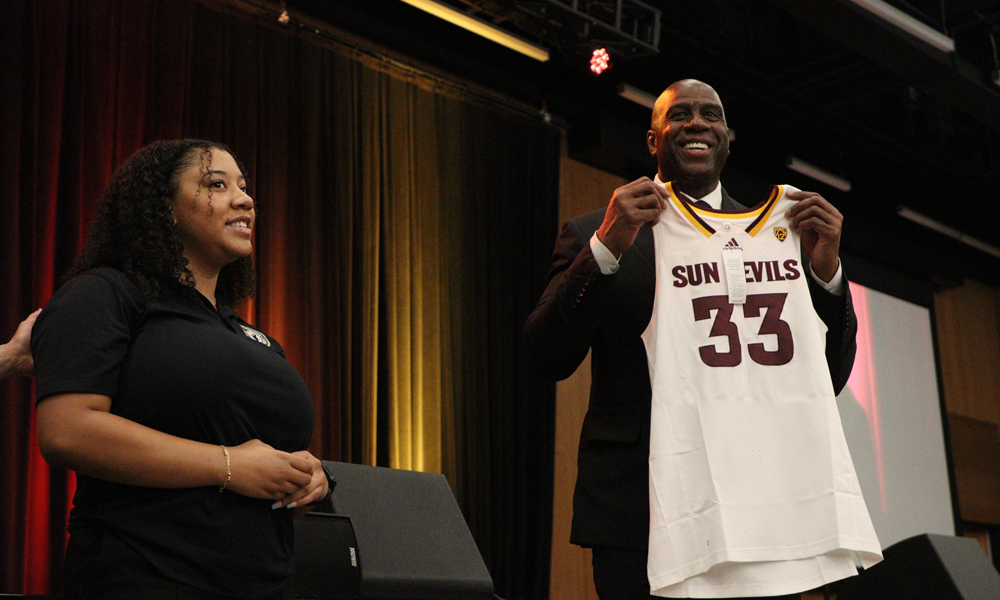The Magic of the King: How MLK's ideals inspired Magic Johnson's journey

Sixty years ago, on June 3, 1964, Dr. Martin Luther King, Jr. electrified a crowd of 8,000 with a stirring call to accept the labor-intensive nature of empathy and universal connection. At the behest of well-known local figures like George Brooks, Sr. and Lincoln Ragsdale, Sr., both esteemed alumni of Arizona State University, King was invited to share his message of optimism in a tumultuous era marked by social upheaval and calls for change.
Despite facing pressure to decline the invitation, ASU President Homer Durham recognized the historic significance of the moment and eagerly provided a venue large enough to accommodate the enthusiastic throng. It was against the backdrop of the Civil Rights Act of 1964 — a landmark piece of legislation that King tirelessly advocated for — that his words took on added resonance, symbolizing the ongoing struggle for equality and justice in American society.
Six decades later, the legacy of that pivotal day continues to reverberate, shaping the diverse and inclusive communities we inhabit today. The ideals espoused by Dr. King remain as relevant as ever, serving as a beacon of hope and inspiration for future generations.
The names of Magic Johnson and Martin Luther King Jr. are woven throughout American history as symbols of tenacity, harmony and advancement. Even though they experienced distinct environments — one in the sphere of civil rights advocacy, the other on the basketball court, and in the corporate world—the principles of equality, opportunity and community development unified their lives.
Magic Johnson, the famous basketball player who later became an entrepreneur and philanthropist, has frequently discussed how his own path was influenced by the teachings and legacy of Martin Luther King Jr. Dr. King's goal for a more equitable and inclusive society is still relevant today thanks to Johnson's experiences, which include his upbringing in a neighborhood with a high concentration of Black people, his groundbreaking work in desegregating schools and his breaking down of barriers in business ownership.
"From everything that he was teaching, everything that he was about, everything he went around to tell people that things had to change for the better. That it has to be a world where everybody is equal and treated with respect and dignity," reflects Johnson, drawing parallels between Dr. King's message and his own convictions.
Johnson can clearly remember key occasions in his early years when he was asked to promote harmony and overcome racial barriers. One such occasion was when his principal sent him to handle conflicts between Black and white pupils at an integrated high school. Johnson was first reluctant to take on the role, but he eventually accepted it and used his leadership abilities to encourage his peers to appreciate one another and work together.
"I benefited from that message because when I grew up, first through ninth grade, basically all-black schools," Johnson recalls. "So, because of his leadership, busing came in. Because he wanted minorities to get a better education, he knew that if he brought the races together, we could get a better education."
Moreover, Johnson's entrepreneurial journey reflects Dr. King's call for economic empowerment within marginalized communities. Through strategic investments and partnerships, Johnson has created opportunities for minority-owned businesses and advocated for economic development in underserved areas.
"As Dr. King said, 'He wanted black and white men to sit at the same table.' So, sure enough, basketball season started. I had to sit at the same table with white basketball players," recalls Johnson, highlighting the importance of Dr. King's vision of unity and brotherhood.
"In honoring Dr. King's legacy, Johnson remains committed to uplifting future generations and breaking down barriers to success," Johnson observes. "By leveraging his platform and influence, Johnson continues to inspire others to embrace Dr. King's teachings of compassion, resilience, and unity."
As Johnson reflects on his journey and the impact of Dr. King's legacy, he emphasizes the enduring relevance of their shared values in today's world. The struggles and triumphs of both men serve as a testament to the power of vision, determination, and collective action in effecting meaningful change.
Through his words and actions, Magic Johnson pays homage to Dr. King's enduring legacy while forging his own path toward a more equitable and inclusive future.
Magic Johnson announced that he would join the ASU family by supporting women in leadership and then awarded three women from the Black African Coalition a sum of 25 grand each. This is only the entry point to his ASU contribution.